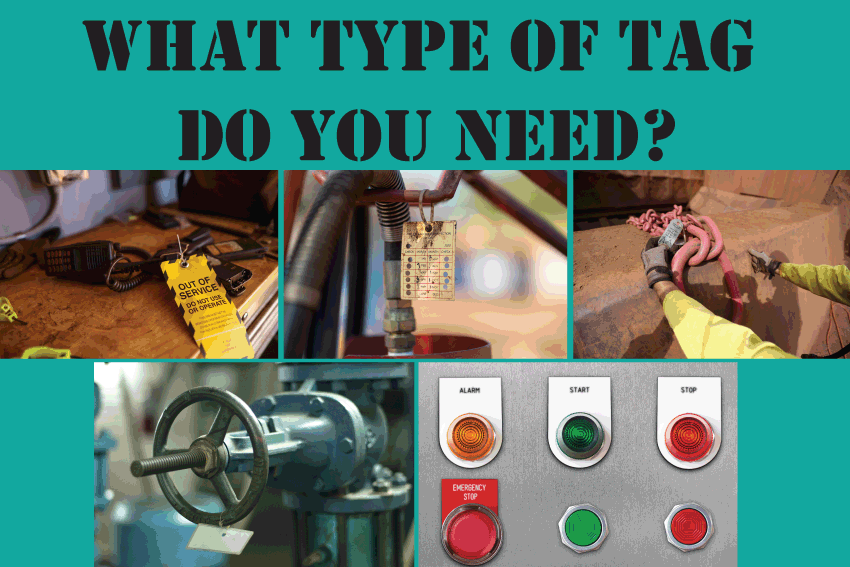
Knowing the facts and possibilities before picking which material is ideal for your tags will save you time and money.
If you need anything for light-duty or office use, your options are less important. However, industrial job environments will necessitate a little more attention in terms of endurance.
We're removing the overwhelming factor from your decision-making process by producing a list of materials explaining your tag material alternatives. Once you've determined where it will go, whether it will be indoors or outside, and whether it will be temporary or permanent, you'll be able to make your decision.
How to Use Tags
Tags can be used for a variety of purposes, the most common of which is to quickly identify equipment, machinery, and valuables. Metal tags are strong enough to withstand the strains of even the harshest environments, such as acids, radiation, or corrosives. Metal tags may come with pre-drilled holes for attachment or can be chained to machinery, pipes, or equipment.
Which Type of Tag Should I Use?
This completely depends on the intended use for your tag. If you're not sure when tags should be metal or plastic, read on to discover the differences and properties of each one.
Aluminium Tags
Anodised aluminium is a lightweight but durable metal that is corrosion-resistant and cost-effective. The anodization technique increases durability while also allowing for colour to be added. And, in most situations, these tags will persist for 20 years or more.
These properties make anodised aluminium tags a good choice for a wide range of applications in a variety of sectors. They are functionally pleasing and can handle practically any circumstance or environment.
The ability to add colour throughout the anodizing process contributes significantly to this attractiveness. Your requirement could be to colour-code specific goods for safety or sorting, in which case, anodised aluminium tags are a strong choice.
Brass Tags
Due to their antique/vintage appearance, brass tags and plates are often popular. They have an appealing, high-quality appearance, making them perfect for ornamental applications.
Some businesses, however, may require brass for safety concerns. It is low-friction and less likely to spark. Brass even has antimicrobial qualities, as well as being extremely durable and corrosion-resistant. Brass is frequently used in plumbing, mining, and maritime applications. However, it is appropriate for a wide range of other scenarios.
Rotary engraving, laser engraving, and stamping are all options for brass. Due to the depth of the marking, rotary engraving is easy to read and long-lasting.
Stainless Steel Tags
Stainless steel is exceptionally long-lasting. It has twice the hardness of brass and three to four times the hardness of aluminium. Furthermore, it is far more resistant to abrasion and damage caused by rough handling or adverse weather conditions. It is highly corrosion-resistant, making it suitable for usage in saltwater marine environments or when strong acids or alkaline compounds are present. Stainless steel can also withstand severe temperatures of up to 2500 degrees Fahrenheit (1,371 degrees Celsius)
Stainless steel's exceptional endurance makes it a good choice for industrial applications in general.
Laser engraving, rotary engraving, and stamping can all be used to mark stainless steel tags and plates.
Plastic Tags
ABS plastic tags are fairly durable, impact-resistant, long-lasting, and cost-effective. ABS plastic’s resistance to chemicals, heat, and physical impacts make it an excellent material for a wide range of applications. However, it is not resistant to alcohols or hydrocarbons.
ABS plastic tags are ideal for non-abrasive, interior applications where weathering, abrasion, and other factors are unlikely to be a concern. As a result, they are great for usage in retail establishments and offices, in which they are widely used as name tags and key tags.
Plastic tags are also non-conductive. As a result, they are perfect for use as warning labels in high-voltage and other locations where electrical safety marking is necessary.
ABS plastic is an incredibly easy material to work with. This means these tags can be marked using a wide range of techniques, including laser engraving or rotary engraving.
Get the Right Tag for You with Label Source
Here at Label Source we have a huge stock of standard-format blank tags for a range of applications. These tags are available in a variety of materials and because they are delivered blank, they can be customised to your specifications.
The high-quality plastic and metal tags from Label Source can be used to mark and identify a wide range of machinery, equipment, fittings, and fixtures. You should be able to discover the correct tag for every need with such a wide variety of forms, sizes, materials, and colours to select from.